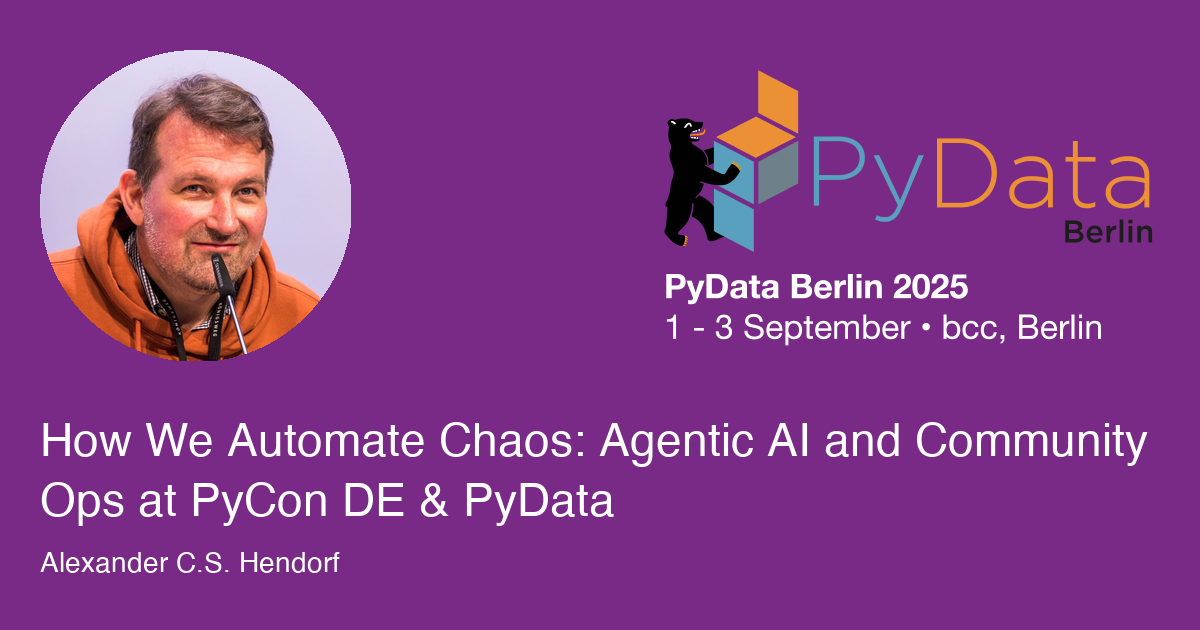PyData Berlin
How We Automate Chaos: Agentic AI and Community Ops at PyCon DE & PyData
Talk

Abstract
Using AI agents and automation, PyCon DE & PyData volunteers have transformed chaos into streamlined conference ops. From YAML files to LLM-powered assistants, they automate speaker logistics, FAQs, video processing, and more while keeping humans focused on creativity. This case study reveals practical lessons on making AI work in real-world scenarios: structured workflows, validation, and clear context beat hype. Live demos and open-source tools included.
Prerequisites
General understanding of software engineering, AI and operations.
Description
Every year, PyCon DE & PyData is run by a rotating crew of volunteers who build a full conference from scratch — in their spare time, with limited tools, shifting knowledge, and lots of coffee. It’s like launching a startup, dismantling it, and repeating from memory.
To survive (and stay sane), we’ve turned conference ops into a sandbox for automation — leaning on scripts, structured documentation, and increasingly, agentic AI systems. Think YAML files, GitHub Actions, custom bots, and LLM-powered assistants doing the boring stuff, so humans can focus on creativity and connection.
This talk is a no-fluff case study in what it actually takes to make automation — and especially AI agents — work in the wild:
* How we went from chaotic Notion boards to reproducible workflows
* How we use LLMs + APIs (LLMs, GitHub, Google, Drives, Pretalx, Pretix,…) to support speaker logistics, FAQs, video app, video cuts, certificates of participation and schedule drafts
* Why Pydantic, Structure and even simple scripts matter more than hype
* And most importantly: why agents are useless without clear structure, validation, and context
We’ll show live examples, share the open tools we’ve built (and broken), and make the case that good community infrastructure is open-source-worthy. If you’re building tools for humans, this talk is for you.
Want to help? We’re actively looking for contributors, testers, and curious minds to build better community tech together — come chat after the talk or find us online.
Speaker
Alexander C.S. Hendorf
Lead Conference Resurrection Engineer
Alexander C. S. Hendorf has over 20 years of experience in digitalization, data, and artificial intelligence. As an independent consultant, he focuses on the practical implementation, adoption, and communication of data- and AI-driven strategies and decision-making processes. While still in law school, he worked as a DJ—before dropping out to join a transatlantic music start-up. The venture evolved into a decent independent label group and, eventually, a small stock corporation, where Alexander became a partner and, at 28, took over as COO. He led the company’s digital transformation and designed systems that could scale with growth. This entrepreneurial journey laid the foundation for his deep understanding of business strategy, technology, and innovation. After closing the chapter on digital music, Alexander turned his focus to data science and AI—initially driven by curiosity, with weekends on Coursera and evenings on GPUs. That passion evolved into a career advising organizations on AI integration, data strategy, and building impact-driven teams. Some say he just picks the flashiest jobs—record label owner, data scientist—but really, he follows his passion: for what’s new, what matters, and what connects people and technology. Today, he supports clients—especially in regulated or legacy-heavy industries—in aligning emerging technologies with real-world business goals. His work emphasizes cultural impact, sustainable change, and interdisciplinary thinking. Alexander is a recognized expert in data intelligence and a frequent speaker and chair at international conferences, including PyCon DE & PyData, Data2Day, and EuroPython. He’s a Python Software Foundation Fellow, EuroPython Fellow, and board member of the Python Software Verband (Germany). Since 2024, he has been driving [Pioneers Hub](https://pioneershub.org), a non-profit supporting vibrant, inclusive tech communities—and helping innovators keep pace in a rapidly changing world.